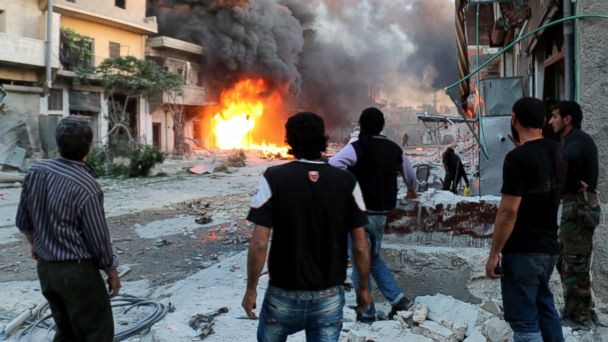Syria Missed Another Chemical Weapons Deadline. Now What?

(Zein Al-Rifai/AFP/Getty Images)
The Syrian government officially broke its pledge to get rid of its entire stash of chemical weapons by Sunday - a move that surprised few American officials but raised questions about how the international community can hold Syrian President Bashar al-Assad accountable for violating the United Nations resolution to which he agreed.
As the deadline passed and Syria still had 8 percent of its declared chemical weapons in its possession, State Department spokeswoman Jen Psaki said that the United States would continue to press the regime to give up its weapons, but she wouldn't make any predictions about how the international community would punish Syria for the delay.
"We're continuing to press through with our international partners for them to meet the deadline," Psaki said Monday - a day after the deadline had passed.
Images: The Syrian Conflict in Photos
But even if the regime surrenders the rest of its declared chemical weapons stash, monitors from the Organization for the Prohibition of Chemical Weapons (OPCW) must first verify whether or not Assad did, in fact, surrender all the chemical weapons he had before it determines whether or not he complied fully with the deal, which the U.S. and Russia brokered as an alternative to U.S. airstrikes, a senior administration official said.
"I never have a reason to believe that Bashar al-Assad tells the truth about anything, but we are not in a position to give a judgment as to whether the declaration is complete or deliberately incomplete, or incomplete but not deliberately so. That's a technical task," the official said.
Syria has missed several other deadlines that have prolonged the process until now. All chemical weapons were originally supposed to be out of the country by early February. The deadline for the destruction of the chemical weapons, once surrendered, is June 30.
Before the verification work gets underway, Western officials are already citing intelligence that Syria deliberately withheld information on its chemical weapons stockpile, according to Reuters.
The Syrian ambassador to the U.N., Bashar Ja'afari, denied that claim to Reuters, and Psaki on Monday underscored that verification process needs to take place before the United States can accuse Assad of deception.
"We've never taken the Assad regime at its word, and we will continue to approach this process with our eyes wide open," she said.
But there is past precedent for regimes getting away with concealing chemical weapons for years, such as the case with Libya, where the OPCW found in 2012 that the Gaddafi regime had been hiding mustard gas, violating a 2004 commitment to surrender any such weapons, noted Robert Zarate, policy director at the Foreign Policy Initiative.
"We shouldn't declare victory yet just because Assad [says that he] has declared all of his chemical weapons," Zarate said.
In addition to trying to get all chemical weapons out of Syria, the OPCW was also investigating claims that the Syrian regime attacked civilians with chlorine gas, a toxic chemical that, while not on the list of items Syria had to surrender, would also be also a violation of a separate provision of the U.N. deal, in which Syria signed on to the Chemical Weapons Convention, which prohibits the use and development of all chemical weapons.
OPCW Director-General Ahmet Uzumcu said in a statement Tuesday that its chlorine inspection team will arrive in the country "soon" and that the Syrian government has agreed to provide security in the areas it controls. (The chlorine gas reportedly was used in rebel-held cities).
The senior administration official noted that chlorine is harder to detect after its use than chemical weapons like sarin because it doesn't leave the same physical evidence in human tissue and the environment.
"That doesn't mean it's undetectable, it just means it's a harder assignment," the official said.
The international community is also discussing the processes by which Syria's twelve chemical weapons production facilities can be destroyed, said the OPCW's special coordinator for the Syria mission, Sigrid Kaag, on Monday.
The senior administration official said that while the destruction process would be getting off to a late start, it was still possible to do.
"It is late, but I don't want to say that it's off the rails," the official said.
It is only after all of these processes are complete - the destruction of the chemical weapons and facilities, the determination about the use of chlorine and the resolution of outstanding questions about Assad's declared chemical weapons - that the international community can consider punishing Assad for any violations of the U.N. agreement.
But since Assad is already likely guilty of war crimes for using chemical weapons on his own people, additional wrongdoing would just be piled on to his rap sheet, said former Under Secretary of State for Arms Control and International Security Affairs Ellen Tauscher.
"The ink's dry on that one," Tauscher said, referring to the use of chemical weapons. "This would just be adding to the litany of already existing international criminal indictments for The Hague."